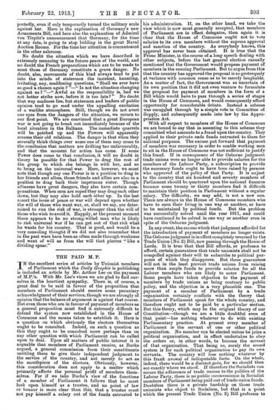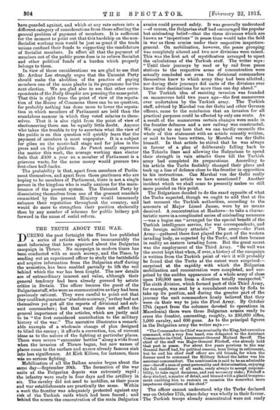THE PAID M. P.
TN the excellent series of articles by Unionist members of Parliament which the Daily Graphic is publishing is included an article by Mr. Arthur Lee on the payment of M.P.'s. With Mr. Lee's views we are glad to find our- selves in the heartiest sympathy. There is, of course, a great deal to be said in favour of the proposition that members of Parliament should receive some pecuniary acknowledgment of their services, though we are strongly of opinion that the balance of argument is against that course. But even those who are in favour of payment of members as a. general proposition must find it extremely difficult to defend the system now established in the House of Commons and the means taken to establish it. Here is a question on which obviously the electors themselves ought to be consulted. Indeed, on such a question as this they ought to be consulted more perhaps than on any other question with which Parliament can be called upon to deal. Upon all matters of public interest it is arguable that members of Parliament receive, as Burke argued, a general commission from their constituents entitling them to give their independent judgment to the service of the country, and not merely to act as the mouthpiece of the electors. Obviously, however, this consideration does not apply to a matter which primarily affects the personal profit of members them- selves. For if we take Burke's view of the functions of a member of Parliament it follows that he must look upon himself as a trustee, and no point of law or honour is more clear than this, that a trustee must not pay himself a salary out of the funds entrusted to
his administration. If, on the other hand, we take the view which is now most generally accepted, that members of Parliament are in effect. delegates, then again. it is clear that the House of Commons ought not to vote salaries to its own members without the express approval and sanction of the country. As everybody knows, this approval has never been obtained. It is true that the Prime Minister, in the course of a long speech dealing with other subjects, before the last general election casually mentioned that the Government would propose payment of members in the ensuing Parliament. But to argue from this that the country has approved the proposal is so grotesquely at variance with common sense as to be merely laughable. As a matter of fact, the Government was so uncertain of its own position that it did not even venture to formulate the proposal for payment of members in the form of a Bill which would have to pass through a series of stages in the House of Commons, and would consequently afford opportunity for considerable debate. Instead a scheme was smuggled through by a simple vote in Committee of Supply, and subsequently made into law by the Appro- priation Act.
With all respect to members of the House of Commons we are bound to say that in assenting to this scheme they committed what amounts to a fraud upon the country. They applied to their private ends funds entrusted to them for national purposes. The excuse put forward that payment of members was necessary in order to enable working men to sit in the House of Commons was not sufficient to justify this fraud. If in consequence of the Osborne judgment trade unions were no longer able to provide salaries for the members of the Labour Party, a subscription to provide the necessary funds ought to have been raised by persons who approved of the policy of that Party. It is unjust to the country that six hundred and seventy members of Parliament should be quartered upon the national finances because some twenty or thirty members find it difficult to maintain their position in Parliament without a regular salary. The difficulty, we may add, is not a new one. There are always in the House of Commons members who have to earn their living in one way or another, or have to be maintained by political funds. But the problem was successfully solved until the year 1911, and could have continued to be solved in one way or another even in spite of the Osborne judgment.
In any event, the excuse which that judgment afforded for the introduction of payment of members no longer exists. The Osborne judgment is in effect completely reversed by the Trade Union (No. 2) Bill, now passing through the House of Lords. It is true that that Bill affords, or professes to afford, certain guarantees that trade unionists shall not be compelled against their will to subscribe to political pur- poses of which they disapprove. But these guarantees will not in the least prevent trade unions from raising more than ample funds to provide salaries for all the Labour members who are likely to enter Parliament. Some people have taken objection to the payment of members by trade unions as being contrary to public policy, and the objection is a very plausible one. The payment of a member of Parliament by a trade organization certainly conflicts with the theory that members of Parliament speak for the whole country, and therefore ought not to be paid by a particular section. But this theory, which may be the original theory of our Constitution—though we are a little doubtful even of that point—has nothing whatever to do with existing Parliamentary practice. At present every member of Parliament is the servant of one or other political organization. No member can be elected unless he joins a political organization, and in effect undertakes to obey the orders or, in other words, to become the servant of that organization. That being so, surely the sound system is for each political organization to pay its own servants. The country will lose nothing whatever by this frank avowal of indisputable facts. On the whole, indeed, there would be a distinct gain, for we should then see exactly where we stood. If therefore the Socialists can secure the adherence of trade unions to the politics of the Labour Party, there is no public inconvenience in Socialist members of Parliament being paid out of trade-union funds. Doubtless there is a private hardship on. those trade unionists who object to Socialism, but that is a point which the present Trade Union (No. 2) Bill professes to have guarded against, and which at any rate enters into a different category of considerations from those affecting the general problem of payment of members. It is sufficient for the moment to point out that this hardship on the non- Socialist working man would be just as great if the trade unions confined their funds to supporting the candidature of Socialist members. In effect all that the payment of members out of the public purse does is to relieve Socialist and other political funds of a burden which properly belongs to them.
In view of these considerations we are glad to see that Mr. Arthur Lee strongly urges that the Unionist Party should make the abolition of the practice of paying members one of the main planks in its programme for the next election. We are glad also to see that other corre- spondents of the Daily Graphic are pressing the same point. That this is right from the point of view of the reputa- tion of the House of Commons there can be no question, for probably nothing has done more to lower the reputa- tion in which members of Parliament are held than the scandalous manner in which they voted salaries to them- selves. That it is also right from the point of view of electioneering there can be equally little doubt. Anyone who takes the trouble to try to ascertain what the view of the public is on this question will quickly learn that the payment of members is most unpopular. It is a subject for gibes on the music-hall stage and for jokes in the press and on the platform. As Punch neatly expresses the matter this week, the average working man elector feels that 2400 a year on a member of Parliament is a grievous waste, for the same money would procure two first-class half-backs.
The probability is that, apart from members of Parlia- ment themselves, and apart from those gentlemen who are hoping to be members of Parliament, there is not a single person in the kingdom who is really anxious for the main- tenance of the present system. The Unionist Party by dissociating themselves from one of the grossest scandals committed by the present Ministry would immensely enhance their reputation throughout the country, and would do more to strengthen their position electorally than by any number of schemes for public bribery put forward in the name of social reform.















































 Previous page
Previous page